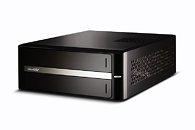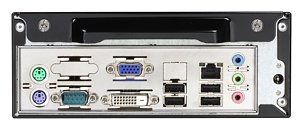Thursday, April 16th 2009

Shuttle Releases Power-saving Nettop with OpenSUSE Linux Operating System
Shuttle Inc., the market leader in the Mini-PC sector and manufacturer of Multi-Form-Factor solutions, is now expanding its portfolio of Mini-PCs with Open Source operating systems. The latest offshoot is the X270V complete system based on the Shuttle Barebone X27D.
As with earlier Shuttle Mini-PCs with pre-installed Linux operating system, the X270V uses OpenSUSE - now in version 11. All PC functions are configured after the first start-up in only a few steps and can then be used immediately. Expansion with program packages is possible at any time by a 1-Click-Installation from the openSUSE website to meet individual requirements."The resource-saving requirements of Linux are ideal for Nettops.", said Tom Seiffert, Head of Marketing & PR at Shuttle Computer Handels GmbH.
The tiny tot with a volume of only a few litres accommodates energy-efficient components from the mobile sector within its highly-polished, black-coated case. The X270V is driven by an Intel dual-core Atom 330 CPU with each core clocked at 1.6 GHz. Up to 2GB of DDR2 memory can be fitted for fluent work with internet and office applications.
Fast Gigabit-LAN, 6-channel audio, PS/2-connectors, serial interface, 6x USB, VGA and DVI-out, connect the X270V to peripheral devices.
The Shuttle X270V Complete System is available immediately in bespoke configurations from specialist retailers or via the Shuttle Systems Configurator. Shuttle's recommended retail price starts from EUR 299 (ex VAT). The Shuttle Systems Configurator is located here. Resellers can be found via the Shuttle StoreLocator.
The Shuttle X270V product page can be found here.
As with earlier Shuttle Mini-PCs with pre-installed Linux operating system, the X270V uses OpenSUSE - now in version 11. All PC functions are configured after the first start-up in only a few steps and can then be used immediately. Expansion with program packages is possible at any time by a 1-Click-Installation from the openSUSE website to meet individual requirements."The resource-saving requirements of Linux are ideal for Nettops.", said Tom Seiffert, Head of Marketing & PR at Shuttle Computer Handels GmbH.
The tiny tot with a volume of only a few litres accommodates energy-efficient components from the mobile sector within its highly-polished, black-coated case. The X270V is driven by an Intel dual-core Atom 330 CPU with each core clocked at 1.6 GHz. Up to 2GB of DDR2 memory can be fitted for fluent work with internet and office applications.
Fast Gigabit-LAN, 6-channel audio, PS/2-connectors, serial interface, 6x USB, VGA and DVI-out, connect the X270V to peripheral devices.
The Shuttle X270V Complete System is available immediately in bespoke configurations from specialist retailers or via the Shuttle Systems Configurator. Shuttle's recommended retail price starts from EUR 299 (ex VAT). The Shuttle Systems Configurator is located here. Resellers can be found via the Shuttle StoreLocator.
The Shuttle X270V product page can be found here.



6 Comments on Shuttle Releases Power-saving Nettop with OpenSUSE Linux Operating System
I am in constant fear of my NAS'ed X27D cooking the 2.5" drives.
Setup and performance benchmarks here: forums.techpowerup.com/showthread.php?t=82785
But then I'm all "300FFKING EUROS? I can build a complete celeron / sempron system for that price... and it will be a REAL computer, not some wannabe 'alternate' os BS... Bugger tiny!!!!"
But that's just me...
EDIT : That power jack looks like it may be in the region of 12v ... Nice idea to be able to power a thing off standard batteries as backup / mobile usage...
^ It uses a power brick just like a laptop.
We have set up such a device for our SB on w2k3. We will *not* fill up the 320GB 2.5" HDD, since we store business files (word, excel, html, pdf) documents and NOT MP3, DivX etc. The 320GB will provide years of data archiving for a SB, and it allows us to run x86 services, like FTP etc..
It is very close to a very solid alternative for windows.
I use suse at work as a desktop for coding in php surf web and gather data from multiple databases.
I must say it still isnt perfect. Yast is slow but I dont really miss anything I could have on windows.
In fact Id rather work on suse than windows because it works very nicely while editing files over networks etc while windows chokes up on any network delays during saving editing.
Not to mention how much better linux handles its resources unlike shitty Vista that makes my home gaming machine bootup like a 486.
Once Yast stops being slow and they tune up the new kde
I give it two years for linux to get a stable position in regular user market.